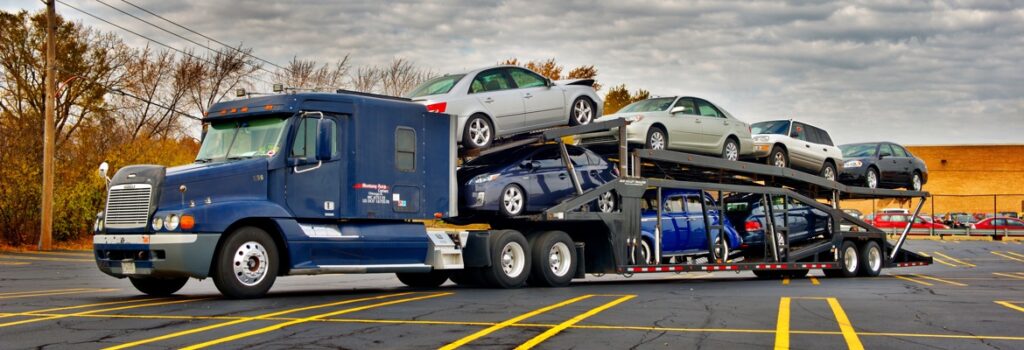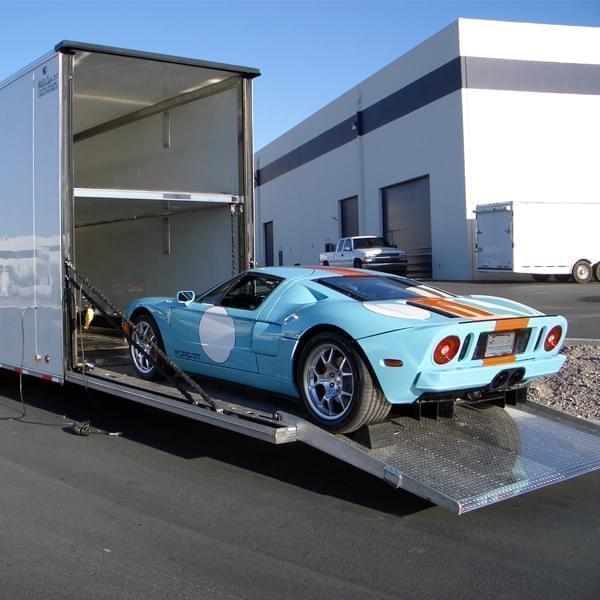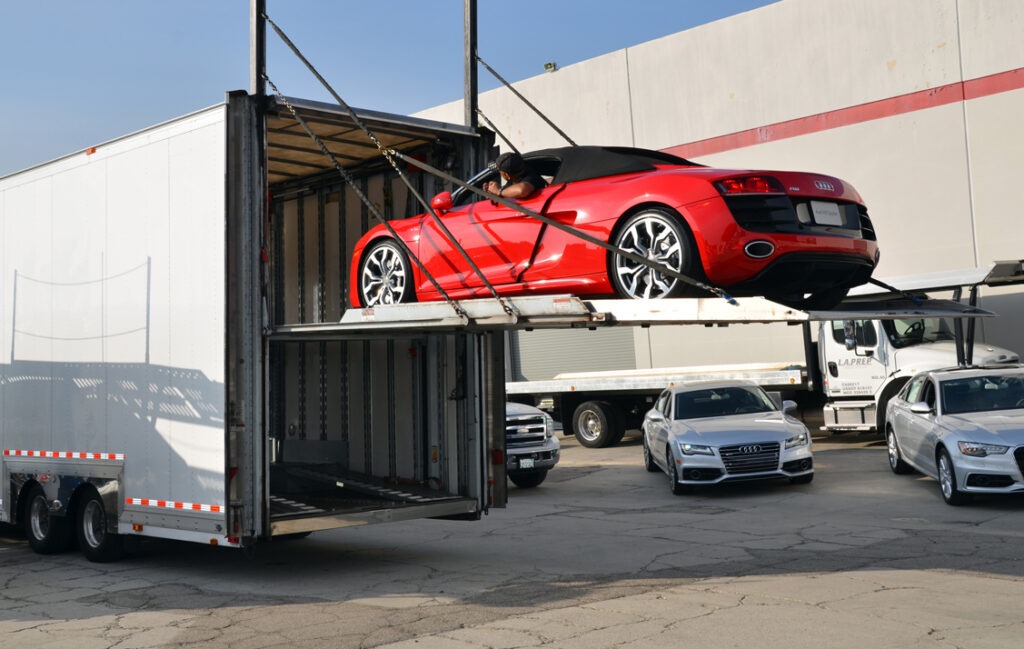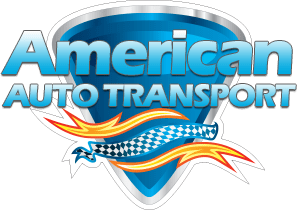Car Hauler vs Equipment Trailer
When it comes to transporting vehicles or heavy equipment, two common options are car haulers and equipment trailers. Both serve distinct purposes and come with their advantages and disadvantages. In this article, we will explore the key differences between car haulers and equipment trailers, as well as their respective applications. Understanding these differences will help you make an informed decision based on your specific needs and requirements for transporting vehicles or equipment.
Key Differences Between Car Haulers and Equipment Trailers

Car haulers and equipment trailers are two different types of trailers used for transporting vehicles and heavy machinery. The key differences between the two lie in their design, capacity, and intended use.
Car Haulers:
- Design: Car haulers are specifically designed to transport automobiles and light trucks. They feature ramps or tilting beds for easy loading and unloading of vehicles.
- Capacity: Car haulers typically have lower weight capacities since they are meant for standard-sized vehicles.
- Intended Use: Car haulers are ideal for transporting cars, SUVs, and small trucks locally or across long distances.
Equipment Trailers:
- Design: Equipment trailers are built to transport heavy machinery, construction equipment, and other bulky loads. They have a flatbed design without specialized features for vehicle loading.
- Capacity: Equipment trailers have higher weight capacities to handle the substantial weight of heavy machinery.
- Intended Use: Equipment trailers are primarily used for commercial purposes, construction projects, and transporting large equipment or machinery.
In conclusion, choosing between a car hauler and an equipment trailer depends on your specific transportation needs. If you need to transport vehicles, a car hauler is the appropriate choice. However, for heavy machinery and equipment, an equipment trailer is the more suitable option.
Different Types of Trailers:

Trailers come in various types, each designed for specific purposes and transportation needs. Here are some of the different types of trailers:
- Utility Trailers: Utility TrailerareVersatile and commonly used for general cargo or transporting small items like lawn equipment, bicycles, or furniture.
- Car Haulers: Specifically designed to transport haul cars, SUVs, and light trucks, featuring ramps or tilting beds for easy loading and unloading.
- Flatbed Trailers: Feature a flat, open deck, ideal for transporting large or irregularly shaped items like construction materials and machinery.
- Enclosed Trailers: Fully enclosed and secure, these trailers are suitable for transporting valuable or sensitive cargo, such as motorcycles, electronics, or furniture.
- Dump Trailers: Equipped with hydraulic systems to lift the trailer bed and unload materials, commonly used in construction and landscaping for transporting loose items like gravel or sand.
- Boat Trailers: Designed to carry boats and watercraft to and from the water, available in various sizes and configurations.
- Livestock Trailers: Specifically designed for transporting livestock, ensuring their safety and comfort during transportation.
Choosing the right type of trailer depends on the cargo you need to transport and the specific requirements of your transportation project. Understanding the different types of trailers will help you make an informed decision that suits your needs best.
enclosed vs open car trailer

When it comes to transporting vehicles, there are two primary types of car trailers: enclosed auto transport and open auto transport. Each option has its own set of advantages and disadvantages, making it essential to understand the differences before making a decision.
Enclosed Car Trailer:
- Advantages: Offers complete protection from the elements, road debris, and potential theft. Ideal for transporting high-value or classic vehicles, providing security and peace of mind.
- Disadvantages: Typically more expensive than open car trailers. Heavier weight may result in reduced fuel efficiency. Limited loading options compared to open trailers.
Open Car Trailer:
- Advantages: Generally more cost-effective than enclosed trailers. Lightweight design results in better fuel efficiency. Open sides allow for easier loading and unloading.
- Disadvantages: Offers less protection from weather conditions, road debris, and potential theft. Not suitable for high-value or classic vehicles that require extra protection.
Choosing between an enclosed and open car trailer depends on the value of the vehicle being transported, the budget, and the level of protection required. If you prioritize maximum protection and security, an enclosed car trailer is the preferred option. However, for standard vehicles or those on a tighter budget, an open car trailer can be a practical and efficient choice for vehicle transportation.
What To Know About Car Haulers

Car haulers are specialized car hauler trailers designed to transport vehicles, making them an essential tool for moving cars, SUVs, and light trucks. If you are considering using a car hauler for vehicle transportation, there are some key aspects to keep in mind:
- Loading Capacity: Check the car hauler’s weight capacity to ensure it can accommodate the weight of your vehicle without exceeding its limits.
- Ramps and Loading Mechanisms: Look for car haulers with user-friendly loading mechanisms like ramps or tilting beds to make loading and unloading easier.
- Security and Tie-Downs: Ensure the car hauler has proper tie-down points and security features to keep your vehicle firmly in place during transit.
- Trailer Size: Choose a car hauler that fits your vehicle’s dimensions comfortably to avoid any potential damage during transportation.
- Licensing and Regulations: Familiarize yourself with local and state regulations regarding car hauler usage and any licensing requirements for towing.
By understanding these key factors and selecting a suitable car hauler, you can safely and efficiently transport your vehicle with confidence.
The Perks of Open Car Haulers

Open car haulers offer several perks that make them a popular choice for transporting vehicles.
- Cost-Effective: Open car haulers are generally more affordable compared to enclosed trailers, making them an economical option for vehicle transportation.
- Easy Loading and Unloading: With their open sides, loading and unloading vehicles on open car haulers is a straightforward process, requiring less effort and time.
- Better Fuel Efficiency: The lightweight design of open car haulers results in improved fuel efficiency compared to heavier enclosed trailers.
- Visibility and Inspection: Open sides provide excellent visibility of the vehicles being transported, allowing drivers to inspect their cargo easily during transit.
- Air Circulation: The open design allows for better air circulation around the vehicles, reducing the risk of condensation and moisture-related damage.
- Versatility: Open car haulers can transport a wide range of vehicles, including standard cars, trucks, and SUVs, without the need for customization.
Overall, the perks of open car haulers make them an attractive choice for vehicle transportation, particularly for regular vehicles and when budget considerations are a priority. By selecting an open car hauler from a reputable provider, you can ensure a safe and efficient vehicle transport experience.
The Advantages of Enclosed Car Haulers

Enclosed car haulers offer several distinct advantages that make them an excellent choice for transporting vehicles, especially high-value or classic cars.
- Enhanced Protection: Enclosed trailers provide complete protection from weather elements, road debris, and potential theft, ensuring the safety and security of valuable vehicles during transportation.
- Reduced Risk of Damage: With vehicles enclosed and shielded from external factors, the risk of scratches, dings, or other damages commonly associated with open car haulers is significantly minimized.
- Customized Loading Options: Enclosed trailers often offer various loading options, such as hydraulic lift gates and adjustable ramps, allowing for easier and safer loading and unloading of vehicles.
- Climate Control: Some enclosed car haulers feature climate control systems, maintaining a stable environment during transit, which is essential for sensitive or classic vehicles.
- Professional Image: Using an enclosed car hauler conveys a professional image, which is particularly valuable for transporting high-end cars for business purposes or events.
While enclosed car haulers may be more expensive than open trailers, the enhanced protection and peace of mind they offer are invaluable, especially when transporting precious or unique vehicles. Choosing an enclosed car hauler from a reputable provider ensures that your valuable vehicles are transported safely and securely to their destination.
Maintenance, Fuel, and Insurance Costs in the Car Haul

When operating a car hauler, it’s crucial to consider the associated costs, which include maintenance, fuel, and insurance expenses.
Maintenance: Regular maintenance is essential to keep the car hauler in top condition. This involves inspecting tires, brakes, and lights, as well as servicing the trailer’s mechanical components. Proper maintenance reduces the risk of breakdowns and ensures safe transportation.
Fuel: Car haulers can be fuel-intensive, especially when transporting heavy loads over long distances. Monitoring fuel efficiency and optimizing driving routes can help manage fuel costs effectively.
Insurance: Adequate insurance coverage is essential to protect against potential accidents or damage to the car hauler and the vehicles being transported. Insurance premiums may vary depending on the trailer’s value, cargo, and coverage limits.
By accounting for these costs and implementing efficient practices, car haulers can operate smoothly and economically while ensuring the safe and reliable transportation of vehicles to their destinations.
FAQs

Can an Equipment Trailer Haul Vehicles?
Yes, an equipment trailer can car hauler trailer vehicles, but there are some considerations to keep in mind. Equipment trailers are primarily designed for transporting heavy machinery and bulky equipment, so they may lack specialized features for safely loading and securing vehicles. However, with proper modifications and equipment, an equipment trailer can be used to transport vehicles. For example, adding ramps, tie-downs, or wheel chocks can make it suitable for hauling cars or smaller vehicles. Before using an equipment trailer to transport vehicles, ensure that it can safely accommodate the weight and dimensions of the specific vehicle being hauled, and take necessary precautions to secure the vehicle properly during transit.
Can a Car Hauler Be Used as a Trailer?
Yes, a car hauler can be used as a trailer for other purposes besides transporting vehicles. Car haulers are essentially trailers with a flatbed design and ramps or tilting beds for loading cars, SUVs, and trucks. The open and versatile design of a car hauler allows it to transport various items, such as furniture, appliances, or general cargo. However, when using a car hauler for non-vehicle transportation, it’s essential to consider weight limits, proper loading techniques, and securing the cargo adequately to ensure safe and efficient transport. With proper precautions, a car hauler can serve as a multi-functional trailer for various car hauling needs.

